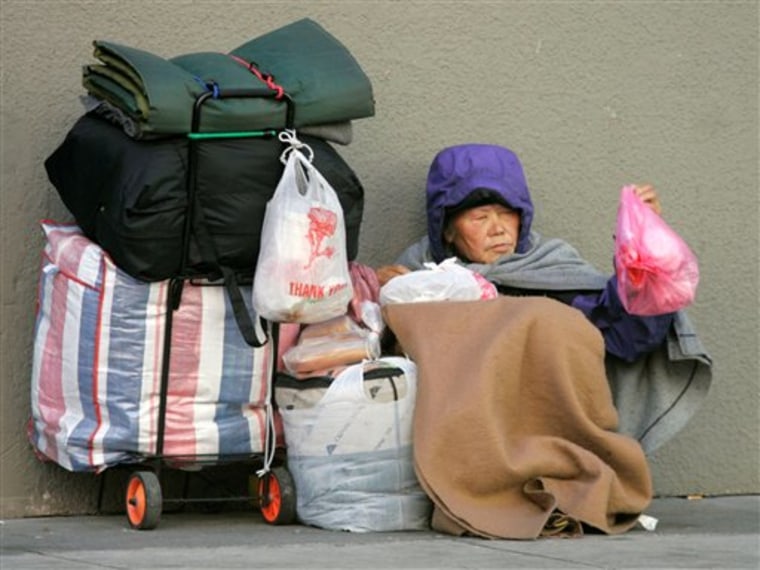In the first major census of people living on the streets since the recession, thousands of volunteers across the United States are fanning out in the thick of night this week to count the most desperate members of their communities.
On the streets and in shelters, volunteers conducting the count in the wintry dead of night have found an untold numbers of hard-luck stories from those homeless for the first time, working poor victimized by the foreclosure and unemployment crises.
"I call it the double trouble," said Philip F. Mangano, executive director of the United States Interagency Council on Homelessness. "You would have to be naive to believe that the loss of over 850,000 homes and over two million jobs wouldn't have an impact."
In Camden, New Jersey, a city that every economic boom bypasses and every bust seems to embrace, the number of people living in an encampment near downtown has grown over the last year, according to the regulars.
'They seem to keep coming'
"They seem to keep coming," said Neil Floyd, a 53-year-old former truck driver who is unable to find work and has lived under a tarp for a year.
In Wichita, Kansas, Sandra Cox, 47, who receives $517 a month in disability payments, ended up in a homeless shelter in December. Her son, the breadwinner, had lost his job at a tuxedo warehouse that went out of business and could only find temporary part-time work.
In Portland, Oregon, inside a crowded homeless shelter, an 81-year-old grandmother, Ilene Reeve, was spending the night feeling lucky to have a bed. Her only other choice was to sleep in the lobby of a post office. She says she can't find a job, nor can she survive on the $754 a month she receives in Social Security.
Although it will be months before officials compile their final tally of those sleeping in alleys and tunnels, under bridges and overpasses and in cars and tents, they expect the totals to substantially higher than the last count two years ago.
In this economy, most cities are reporting a huge increase in the need for shelter. They include working poor renters who end up getting evicted when their landlords default.
But some advocates for homeless people say the biannual, federally mandated counts taking place on a single night or at some point this week will omit the majority of homeless people, including the recession's recent victims.
Required for federal funds
The count, which the Department of Housing and Urban Development requires for any community seeking federal funds for homeless programs, includes those on the street as well as people in homeless shelters, transitional housing, and in hospitals, mental wards and jails.
The census, which HUD has required since 2005, does not count those doubled up with friends or relatives, staying in hotels or garages or in any other makeshift, inadequate housing.
The last census, in 2007, found 671,888 people nationwide were homeless. Of those, 123,798 were classified as "chronically homeless, which HUD defines as someone homeless for a year or more, or with four instances of homelessness within three years. The Department of Education, which lists people doubled up as homeless, counted 688,000 homeless children in public schools for the 2006-2007 school year.
Many advocates say the majority of families experiencing homelessness in this economy are not on the streets or in shelters, but doubled up or in some other marginal situation.
"We hope the Obama administration will stop these ridiculous point-in-time head counts," said Paul Boden, executive director of the Western Regional Advocacy Project, a San Francisco-based advocacy group for the homeless that includes five Western cities — San Francisco, Seattle, Portland, Los Angeles and Oakland.
Since so many people who need decent housing will not be counted, Boden said, the spot count is inadequate. "Homelessness is way, way up," he said, but the census, when released in over a year, will not reflect the true numbers.
Not entirely scientific
Brian Sullivan, a spokesman for HUD, said that while the homeless count is not entirely scientific, most communities find it useful. "It gives a basis for communities to evaluate their needs and the effectiveness of their programs," he said.
Steve West, a 47-year-old painter from Milwaukee, sleeps in a rescue mission at night and spends his days on the streets bundled up in layers of clothes. He says he became homeless three months ago when he lost his job and his wife kicked him out of the house.
"It's hard to find work," said West. "With the economy, no one's doing any painting."
In Mobile, Alabama, people who came from elsewhere looking for a better life have ended up in a shelter, unable to find work. Shawn Mazur, 27, is one of those. He had lost his heating and air conditioning job in Kansas City, Missouri, recently and moved to Mobile to find work. He found none.
Patricia Cook, of St. Cloud, Minnesota, became stranded in Mobile in December when her car broke down. She had been staying under a bridge, embarrassed by her situation. But, she said, she was glad homeless people were being counted.
"We're not throwaway people," she said.
